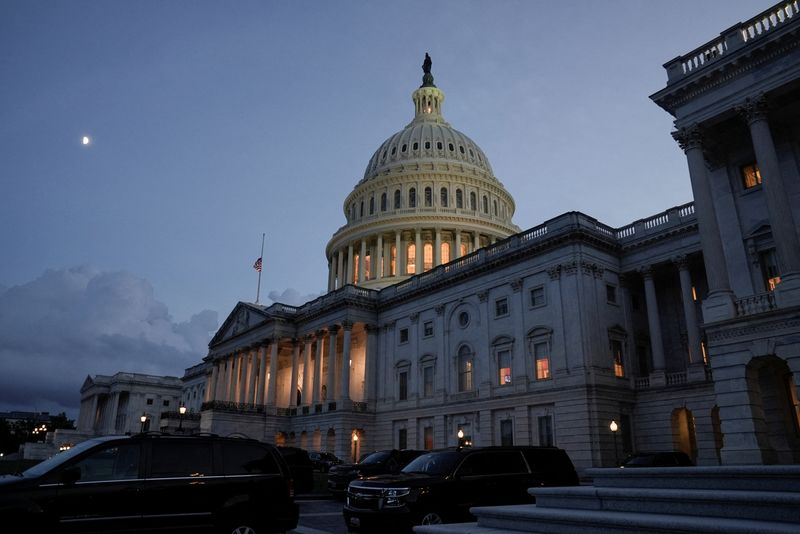
©Reuters. File photo: U.S. Congress after U.S. Vice President Kamala Harris breaks a 50-50 split on the Senate floor to vote to advance the Inflation Control Act at the Capitol in Washington, DC, on August 6, 2022. A panoramic view of the parliament building. .Reuters/K
Written by Richard Cowan, David Morgan, Makini Bryce
WASHINGTON (Reuters) – U.S. Congress overwhelmingly passed a $1.2 trillion budget early Saturday, keeping the government funded through the fiscal year that began six months ago and signing the bill into law. A letter was sent to President Joe Biden asking him to avoid a partial shutdown.
The vote to pass was 74-24.
Key federal agencies, including the Department of Homeland Security, which oversees the Internal Revenue Service, the Department of Justice, the State Department and the Treasury Department, will continue to receive funding through September 30 after the bill passes the Democratic-controlled Senate.
But the bill does not include funding, primarily for military aid to Ukraine, Taiwan and Israel, that was included in a separate bill passed by the Senate but ignored by the Republican-led House. do not have.
Senate leaders spent Friday negotiating a number of amendments to the budget bill that ultimately died. The delay pushed the passage beyond a deadline of midnight Friday.
However, the White House Office of Management and Budget issued a statement saying no agencies would be ordered to close and expressing confidence that the Senate would quickly pass the bill, which it did.
Congress accomplished its mission, but deep partisan rifts resurfaced, along with sharp disagreements within the House's narrow and uneasy Republican majority. Conservative lawmaker Marjorie Taylor Greene threatened to force a vote to remove fellow Republican Speaker Mike Johnson from office for allowing the bill to pass.
The 1,012-page bill would provide $886 billion in funding to the Pentagon, including additional U.S. troops. Democrat Biden has indicated he intends to sign it.
Prime Minister Boris Johnson relied on parliamentary maneuvering on Friday to sidestep hardliners in his party, as he has done more than 60 times since taking over from his ousted predecessor Kevin McCarthy in October, winning 286 votes. The bill passed with a huge majority of 134 votes. Supports Democrats over Republicans.
For much of the past six months, the government has been funded by four short-term stopgap measures that rating agencies say could undermine the creditworthiness of a federal government with nearly $34.6 trillion in debt. This is a manifestation of the brinkmanship policy that we have repeatedly warned about.
“This bill is truly a national security bill, and 70% of the funds included in this package will strengthen our military readiness and industrial base, increase pay and benefits for our brave service members, and support our closest allies. for national defense, including investments in the United States,” said Republican Sen. Susan Collins, one of the lead negotiators.
Opponents charge that the bill is too expensive.
“It's reckless. It's going to lead to inflation. It's a direct vote to steal paychecks,” said Republican Sen. Rand Paul, who opposes most of the spending bill.
The last time the federal government was partially shut down was from December 22, 2018 to January 25, 2019, during President Donald Trump's term. The record-long disruption to government services came as Republicans called for money to build a wall along the border with Mexico. And he was unable to broker an agreement with the Democratic Party.
green goes wild
The new budget passed the House of Representatives with 185 Democratic votes and 101 Republican votes, prompting Greene, a hardline conservative, to introduce measures to oust Johnson.
The move had echoes of October, when a small group of hardliners engineered a vote to remove Mr. McCarthy for relying on Democrats to pass stopgap measures to avoid another partial government shutdown. They have been angry with Mr. McCarthy since June, when he agreed with Mr. Biden on a fiscal year 2024 spending outline that was passed Friday.
Mr. McCarthy's ouster suspended the House for three weeks as Republicans struggled to find new leadership, an experience many in the party say they don't want to repeat as the November election approaches. Said.
And Green said she would not seek an immediate vote on her motion to force Johnson to step down.
“I filed a motion to evict today, but this is more of a warning than a pink slip,” the Georgia Republican told reporters.
Indeed, some Democrats said Friday that they would vote to retain Mr. Johnson if he called for a vote on the $95 billion security aid package for Ukraine, Israel and Taiwan that the Senate had already approved. .
The measure is unlikely to be proposed any time soon, as lawmakers are scheduled to leave Washington for a two-week vacation.
Some Republicans oppose increased funding to Ukraine, raising concerns that Russia could seriously undermine Kiev's ability to continue defending itself.
Life is unlikely to get easier for Mr Johnson any time soon, with the resignations of two members of his caucus, Ken Buck and Mike Gallagher looming, and within a month Mr Johnson's majority will be just 217 votes. The number is expected to drop to 213. At that point, Johnson would only need to lose one vote from his party on any bill that Democrats unite to oppose.


